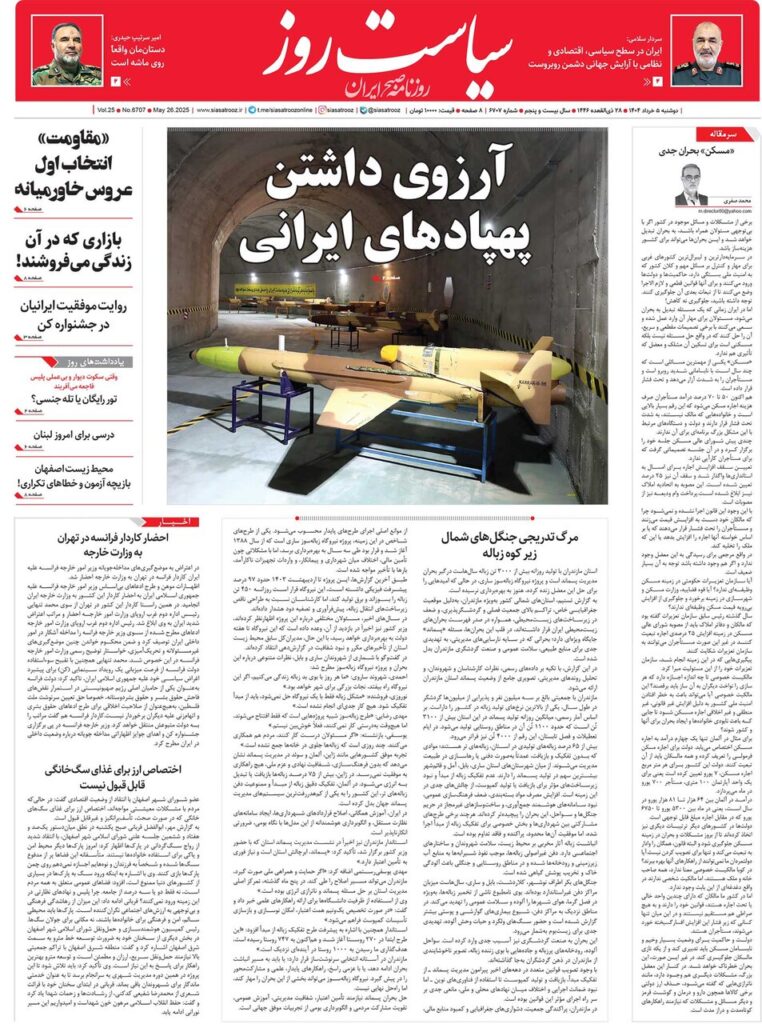In a Tehran-Memo, Siasat-e-Rooz discussed the power and value of Iranian drones.
It writes as follows: The manufacture of drones in Iran dates back to the early days of the Islamic Revolution when young Iranians entered the battlefield without any knowledge during the sacred era of defence. Thanks to indigenous knowledge and reverse engineering of equipment, Iran is profiting from a large, diverse fleet of drones. These drones cost millions of dollars. They only cost thousands of dollars. They are so efficient that even major countries dream of having them. Iranian drones have been a hot topic for years, and many military forces around the world have seen their efficiency. Some countries also bought them. President Donald Trump, who recently traveled to certain Persian Gulf Arab countries, pointed out Qatar’s Iranian drones in front of the head of America’s largest American company, describing them as “very good, fast, and deadly.”
Donya-e-eqtesad: Government must restore market trust
In the analysis, Donya Ektesad is working on market responses and political developments, particularly nuclear negotiations. It writes as follows: Market actions have shown many times this year that the domestic market is optimistic about political negotiations between Iran and the US. This is the most important and reliable indicator to enhance the chances of successful negotiations. This behavior is natural in the Iranian economy. In other words, it is understandable and acceptable. Policymakers seem to be unsatisfied with the market’s actions and view it as a negative signal of negotiations, weakening the bargaining power of Iran and abuse by the opposing side that imposes will towards Iran. However, the reality is that governments should not only view this role in the market as a factor of threat or weakness, but as a great unique opportunity for internal consensus and national unity, but also mobilize the country’s capabilities in the field of diplomatic war and make the necessary use to advance negotiations and political and economic goals. Governments need to use market trust and its domestic policies and movements as opportunities.
Iran: Redefine the neighbours of new equations
In the commentary, the Iranian newspaper discussed Pakistani Prime Minister Shabaz Sharif’s visit to Tehran, saying: The trip is a sign of Islamabad’s special approach to strengthening bilateral relations with key neighbours and allies, and is taking place at a sensitive time given the tensions in the region. The presence of Pakistan’s Prime Minister in Tehran is not merely a halt of his regional tour. It is also a sign of the intersection of interest between the two countries in the security and economic sectors, particularly since the Pezeshkian government tried to design a new model of bilateral relations and effectively counteract efforts aimed at harming Tehran and Islamabad relations. According to Mashala Shakkari, former Iranian ambassador to Pakistan, the visit is a key step towards reviving relations between Tehran and Islamabad. Though sometimes plagued by misunderstandings and geopolitical developments, bonds have always provided opportunities to rebuild trust and strengthening.
Ettelaat: Why did Witkov leave the table negotiating with Iran?
In the article, Eterato analysed Steve Witkov’s unconventional departure from the Roman negotiation table, seeking the views of Medi Motaharnia, an analyst of international and political issues. He said: Witkov’s departure from negotiations was unexpected and, of course, a bad excuse to express his actions of sending messages related to his departure. This departure and its consequences illustrate the issue that Witkov previously admitted that if Iran had not accepted the US red line, he would leave negotiations. Based on what we are currently observing, negotiations have reached a very sensitive stage. These negotiations, held in the mediation in Omani, reached a deadlock. If you want to focus on the key points of negotiations, you can say there is a difference in nuclear enrichment. Iran emphasizes its sovereignty that enriches uranium within its home, and believes that the Iranian government should be able to exercise this sovereignty freely, and that the US is calling for a halt of these activities.

